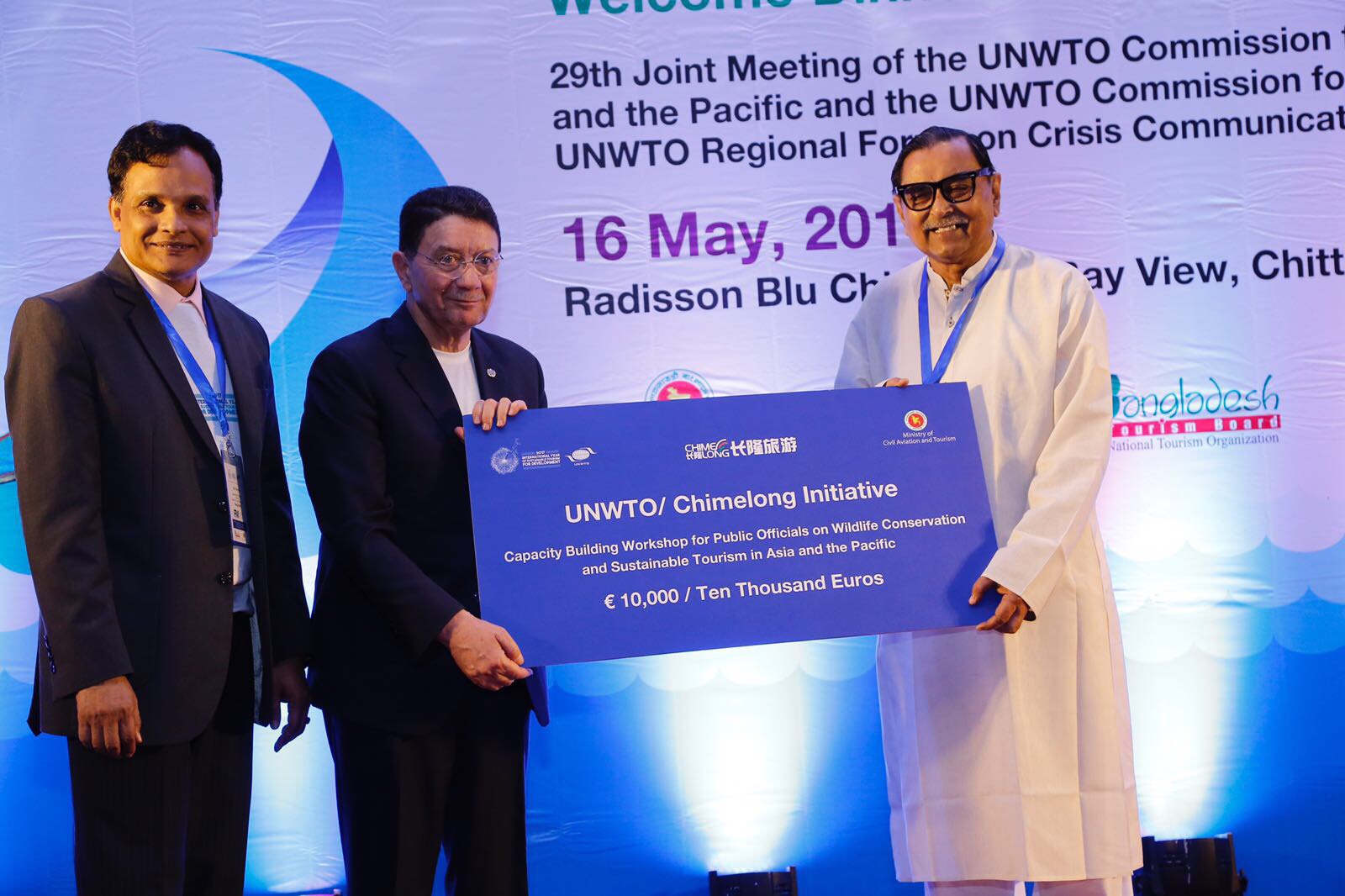

UNWTO Commission for Asia and the Pacific meets in Bangladesh
In 2016, Asia and the Pacific received 309 million international tourist arrivals, 9% more than in 2015; by 2030 this number is expected to reach 535 million. Over 20 countries gathered in Bangladesh on 16-17 May for the 29th joint meeting of the UNWTO Commissions for Asia and the Pacific and South Asia, to discuss challenges facing the sector in the region, opportunities for sustainable tourism development and the programme of work of UNWTO in Asia for the coming two years.
“With growth comes power, and with power, comes responsibility. With 1.8 billion international tourists foreseen to travel the world by 2030, we could end up with 1.8 billion opportunities or 1.8 billion disasters. These 1.8 billion travellers can and should translate into opportunities for inclusive economic growth, for more and better jobs, opportunities to protect our natural and cultural heritage, to better know and respect each other, to bond people, to distribute wealth and share prosperity,” said UNWTO Secretary-General Taleb Rifai, opening the event.
“Tourism can help us achieve the Sustainable Development Goals (SDGs). Your presence in Bangladesh will help us to support our tourism sector achieve its potential,” said the Minister of Civil Aviation and Tourism of Bangladesh, Rashed Khan Menon.
The meeting recalled the advances of the region in terms of visa facilitation, namely in Indonesia and India, in line with UNWTO’s priority to promote safe, secure and seamless travel. It also reviewed the work of the UNWTO technical committees on tourism competitiveness, sustainability, statistics and Tourism Satellite Account (TSA), and the activities being carried out at national level to celebrate the International Year of Sustainable Tourism for Development 2017.
Further items on the agenda included the transformation of the UNWTO Global Code of Ethics into an international convention and the creation of national committees on tourism ethics. Fiji was selected to host the 2018 Regional Commissions meeting and India as the proposed host country of the official celebrations of World Tourism Day in 2019.
Marking the International Year, UNWTO announced its support to Bangladesh in implementing capacity building programmes on wildlife and tourism within the UNWTO/Chimelong Initiative. Wildlife is one of the most important tourism assets of Bangladesh.
The joint meeting was preceded by a regional forum on crisis communication in tourism, with a step-by-step review of how to prepare a crisis communication plan and exchange of experiences in managing communication in situations of crisis, and of strategies for recovery.

2nd UNWTO Report on Gastronomy Tourism: sustainability and gastronomy
A major component of history, tradition and identity, gastronomy has also become a major motivation to visit a destination. According to the 2nd UNWTO Report on Gastronomy Tourism, this tourism segment “offers enormous potential in stimulating local, regional and national economies and enhancing sustainability and inclusion”. The Report was presented in the recent 3rd UNWTO World Forum on Gastronomy Tourism, held in San Sebastian, Spain in cooperation with the Basque Culinary Center.
Sixteen good practices in Gastronomy Tourism from different countries are showcased in the 2nd UNWTO Report on Gastronomy Tourism, touching on issues such as seasonality, training and innovation, ICT-related initiatives and wine-related itineraries. The publication stresses that in terms of tourist motivations, experiencing gastronomy is now at a similar level to visiting a museum, enjoying music and admiring the architecture of a destination. In this sense, gastronomy tourism has strong potential to improve destination management, promote cultures and contribute to other sectors such as agriculture and food manufacturing.
The commitment of gastronomy tourism towards the principles of sustainability has been one of the conclusions of the Forum held in San Sebastian. This includes areas such as poverty reduction, efficient use of resources, environmental protection and climate change, and the protection of cultural values, heritage and diversity.
The event was attended by around 250 participants from 60 countries and was inaugurated by UNWTO Secretary-General Taleb Rifai, Eneko Goia, Mayor of the City of San Sebastian, and the Director of the Basque Culinary Center, Joxe Mari Aizega.
The engagement of the traveller in these principles through his/her gastronomic experience was also underlined throughout the Forum. The need to develop appropriate policy measures and a strong governance framework was highlighted as a major conclusion. This would facilitate not only the commitment of relevant actors, but also the interaction among them, as well as the development of private-public partnerships.
The union between gastronomy and tourism provides therefore a platform to revitalize cultures, to preserve tangible and intangible heritage, to empower communities and to enhance intercultural understanding. These aspects were particularly tackled during the practical experiences included in the Forum, such as a cooking class and farm-to-table dining experiences.
